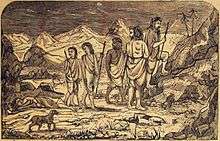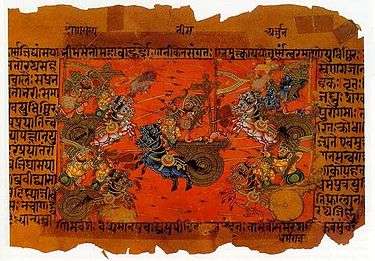Mahaprasthanika Parva

Mahaprasthanika Parva (Sanskrit: महाप्रस्थानिक पर्व), or the "Book of the Great Journey", is the seventeenth of eighteen books of the Indian epic Mahabharata. It has three chapters.[1][2] It is the shortest book in the Epic.[3]
Mahaprasthanika Parva recites the journey of the Pandavas across India and finally their ascent towards Himalayas, as they climb their way to heaven on Mount Sumeru. As they leave their kingdom, a dog befriends them and joins their long journey. On their way, Draupadi dies first. Four of the Pandava brothers also die midway. Only Yudhishthira reaches Mount Sumeru. Their conversations, and reasons for not reaching heaven are described in Mahaprasthanika Parva.[1][4]
Structure and chapters
Mahaprasthanika Parva (book) has 3 adhyayas (sections, chapters) and has no secondary sub-parvas (sub-books or little books).[2] It is the smallest book of the epic.[3]
Background

At the end of Mausala Parva, Vyasa advises Arjuna and his brothers to retire and renounce their kingdom as the purpose of their life has been served. Arjuna informs Yudhishthira of Vyasa's advise. Draupadi and the brothers agree.[5]
Summary
King Yudhishthira crowns Parikshit as the king of Hastinapur, in care of Yuyutsu. In Indraprastha, Yadava prince Vajra is crowned as the king. Then they start their journey of India and the Himalayas.
As the Pandavas leave, a dog befriends them and they take him along for the journey. The Pandavas first go south, reaching the salt sea.[2] At the coast of the salt sea, deity Agni appears and asks Arjuna to return his bow. Agni says that this bow was given to him by the gods to fight the evil on earth. Now, that purpose has been served and so Arjuna should return the bow back to the gods. Arjuna returns his bow. They turn southwest visiting sites along the way. Thereafter, they head west to see Dwaraka. They see it submerged under the sea, as described by Arjuna in Mausala Parva. The sight of a beautiful city submerged and dead, makes them depressed. They turn north, stop at Rishikesh, then cross the Himalayas.[2]

As they cross the Himalayas, Draupadi is the first person to die. Bhima asks Yudhishthira why Draupadi died early and couldn't continue the journey to heaven. Yudhishthira claims that Draupadi suffered from the vice of partiality, in her affections for Arjuna. The remaining Pandavas continue their journey. Next, Sahadeva dies on the way. Yudhishthira explains Sahadeva like his other brothers was virtuous in every respect, except he suffered from the vice of pride and vanity, thought none was equal to him in wisdom. The brothers continue on their way to Mount Meru. Nakula dies next. Yudhishthira explains that Nakula also suffered from the vice of pride and vanity, thinking he was the most handsome person in the world. Arjuna is the next person to die without completing the journey. Yudhishthira explains to Bhima, Arjuna too suffered from the vice of pride and vanity, thinking he was the most skilled, most powerful warrior in the world. Yudhishthira, Bhima and the dog continue forward.[1]
Bhima tires and falls down. He asks his elder brother why he, Bhima, is unable to complete the journey to heaven. Yudhishthira explains his brother's vice of gluttony, who used to eat too much without thinking about the hunger of others.[6]
Yudhishthira and the dog continue their journey. In Chapter 3 of Mahaprasthanika Parva, as the dog and Yudhishthira continue their walk up Mount Meru,[1] Indra appears with his chariot, suggesting he doesn't need to walk all the way, he can jump in and together they can go to heaven. Yudhishthira refuses, says he could not go to heaven with Indra without his brothers and Draupadi. Indra tells Yudhishthira, all of them after their death, entered heaven. Yudhishthira asks if his friend, the dog, can jump into the chariot first. Indra replies dogs cannot enter his chariot, only Yudhishthira can. Yudhishthira refuses to leave the dog. He claims the dog is his friend, and for him to betray his friend during his life's journey would be a great sin. Indra urges him to consider his own happiness, abandon the dog and hop into the chariot. Yudhishthira refuses to go into the chariot, explaining he cannot abandon the dog who is his companion, for his own happiness, while he is alive. The dog, watching Yudhishthira's commitment for his friend, transforms and reappears as deity Dharma. The deity Dharma then praises Yudhishthira for his virtues. Yudhishthira enters heaven on Indra's chariot.[2]
English translations
Mahaprasthanika Parva was composed in Sanskrit. Several translations in English are available. Two translations from 19th century, now in public domain, are those by Kisari Mohan Ganguli[2] and Manmatha Nath Dutt.[1] The translations vary with each translator's interpretations.
Debroy, in 2011, notes[3] that updated critical edition of Mahaprasthanika Parva, after removing verses generally accepted so far as spurious and inserted into the original, has 3 adhyayas (chapters) and 106 shlokas (verses).
Quotes and teachings
Mahaprasthanika parva, Chapter 3:
I never give up a person that is terrified,
nor one that is devoted to me,
nor one that seeks my protection,
nor one who is afflicted or destitute,
nor one that is weak in protecting oneself,
I shall never give up such a one till my own life is at an end.
See also
References
- 1 2 3 4 5 Mahaprasthanika Parva The Mahabharata, Translated by Manmatha Nath Dutt (1905)
- 1 2 3 4 5 6 Mahaprasthanika Parva The Mahabharata, Translated by Kisari Mohan Ganguli, Published by P.C. Roy (1893)
- 1 2 3 Bibek Debroy, The Mahabharata : Volume 3, ISBN 978-0143100157, Penguin Books, page xxiii - xxiv of Introduction
- ↑ John Murdoch (1898), The Mahabharata - An English Abridgment, Christian Literature Society for India, London, pages 132-137
- ↑ Mahaprasthanika Parva The Mahabharata, Translated by Kisari Mohan Ganguli, Published by P.C. Roy (1893)
- ↑ C Rajagopalachari (2008), Mahabharata, 52nd Edition, Bhavan's Book University. ISBN 81-7276-368-9
- ↑ Mahaprasthanika Parva The Mahabharata, Translated by Manmatha Nath Dutt (1905), Chapter 3, Abridged
External links
- Mahaprasthanika Parva, English Translation by Kisari Mohan Ganguli
- Mahaprasthanika Parva, English Translation by Manmatha Nath Dutt
- Mahaprasthanika Parva in Sanskrit by Vyasadeva with commentary by Nilakantha - Worldcat OCLC link
- Mahaprasthanika Parva in Sanskrit and Hindi by Ramnarayandutt Shastri, Volume 5
- PDF and eBook of Ganguli’s translation, with Sanskrit PDF.
- “Yudhishthira and His Dog”, A4 PDF, tablet version (Ganguli’s version annotated) and Sanskrit text links.
